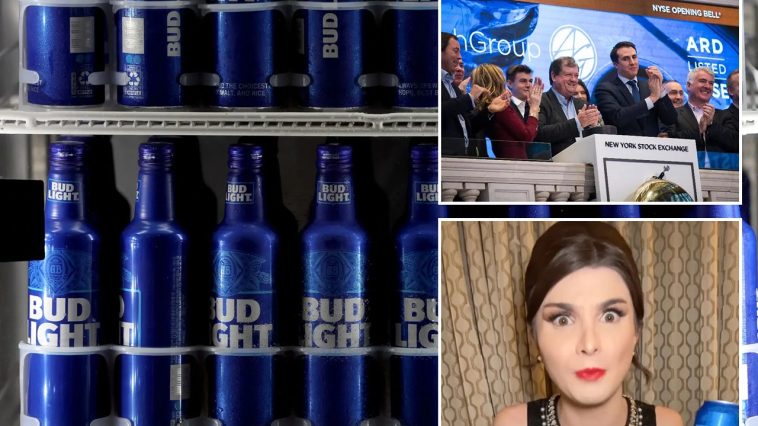LISTEN HERE:
A global glass manufacturer, The Ardagh Group, is grappling with significant financial fallout following the ill-fated promotional venture by Bud Light entertainment involving Dylan Mulvaney, a transgender personality.
Faced with waning sales and consequent redundancies, the tough reality is leading to the closure of Ardagh plants located in North Carolina and Louisiana, and consequently depriving around 645 workers of their livelihoods.
The Ardagh Group, which secures its contracts mainly from the reputed brewer Anheuser-Busch, announced these plant closures slated for July without giving any concrete reasons. However, thorough reporting by WRAL has apparently tracked down the root of the shutdowns to the plunging sales figures of Bud Light.
Respective chains involved in the retail, distribution, and contractual procedures are feeling the heat from the ongoing national boycotts which ensued post the contentious promotional partnerships with Mulvaney under the banner of ‘365 Days of Girlhood’.
Workers deployed in both factories reportedly reported notable dips in productivity levels following widespread attention garnered by a video in April. In the said video clip, Mulvaney proudly announced the brand collaboration on a popular social platform.
The ripple effects of this promotional event were felt far and wide, including a maintenance mechanic who highlighted its impact on these factories’ operations.
In their testimonies, the employees opened up about their factories being forced to surrender some of their machine operations.
The mechanic involved cited the ‘Bud Light incidence’ as the leading cause of their unexpected operational challenge. Remarkably, the common thread binding their experience together was the notorious online promotion revolving around Bud Light.
More insights emerged from the Ardagh Group’s internal communication, a memo to be precise, accessed by WRAL, that expressed the administration’s concerns about the low-selling Anheuser products as the motive behind shutting down both facilities.
Veteran employees admitted that they were not shocked by the decision given that their plants significantly depended on the production of bottles for Budweiser and Bud Light.
There was more to it, as employees stationed at Wilson, North Carolina testified. It appeared that their manager confirmed the closing of their plant was a resultant action of the sweeping Bud Light boycott.
‘Since Budweiser has put a hold on the sale of the same bottle, we don’t require our products in the market,’ admitted David Williams, a maintenance mechanic, in a conversation with WRAL.
Bud Light began noticing a slump in their sales from April, ironically when they decided to give Mulvaney special cans in recognition of one complete ‘girlhood’ year.
The sequence of events was highlighted by the second video featuring Mulvaney, this time enjoying Bud Light in a bathtub. The casual video ignited fury online, leading to nationwide boycotts and triggering a dip in sale which is yet to see a revival.
The consequences of the controversy have been far-reaching, to say the least, with drastic losses in market value amounting to billions. Realizing the gravity of the backlash, Bud Light resorted to damage control mode in no time.
It resulted in desperate measures such as heavy discounts on beers and rebates that essentially make Bud Light ‘practically free for consumers’ in specific regions.
On top of that, the brewer has also extended support for distributors and boosted its advertising budget in attempts to salvage what they can.
They also rolled out a summer ad campaign coupled with CEO Brendan Whitworth appearing on ‘CBS Mornings’ to shed light on the notorious mishap.
Nevertheless, despite the string of salvage efforts, Bud Light has yet to escape the long shadow of the criticism targeting the brand.
An ongoing slide in beer sales has been a telltale sign of the lingering backlash that Bud Light is yet to overcome. A given week-ending June 3 witnessed a steep 24.4% drop in Bud Light sales compared to the same period from the previous year.
Further highlighting Bud Light’s precarious situation is a recent report from NielsenIQ data as relayed to FOX Business by Bump Williams Consulting.
The data demonstrated Modelo Especial surpassing Bud Light as the highest selling beer on dollar basis, a changing of the guard that happened both on the four-week period and the single-week period ending June 3.
The stir surrounding the Bud Light campaign has not gone unnoticed by Mulvaney, the influencer caught in the center of the storm. In a recent outburst, Mulvaney chided the controversy linked to Bud Light, articulating how it has led to a higher degree of intimidation and incited ‘more rampant transphobia than anticipated.’
Mulvaney went on to reproach the company for not rendering the anticipated level of support through the backlash. Highlighting their struggle with ‘transphobia’, Mulvaney pointed out the inadequate assistance they received from the company during this turbulent period.
The quandary that Bud Light finds itself in due to its beleaguered promotional campaign is a somber reminder of the complexities entangled in touching upon sensitive themes in advertising.
Equipped with a conservative ethos, consumers expect their choice of beer to be associated with the principles they admire, not embroiled in controversy.
The Ardagh Group’s plant closure and the accompanying job losses stand an unfortunate testament to the unintended and far-reaching consequences that a poorly executed promotion can entail.
Beyond monetary losses, it clearly brings forth the human aspect of business decision making and marketing tactics that often tend to be overlooked in corporate rhetoric.


